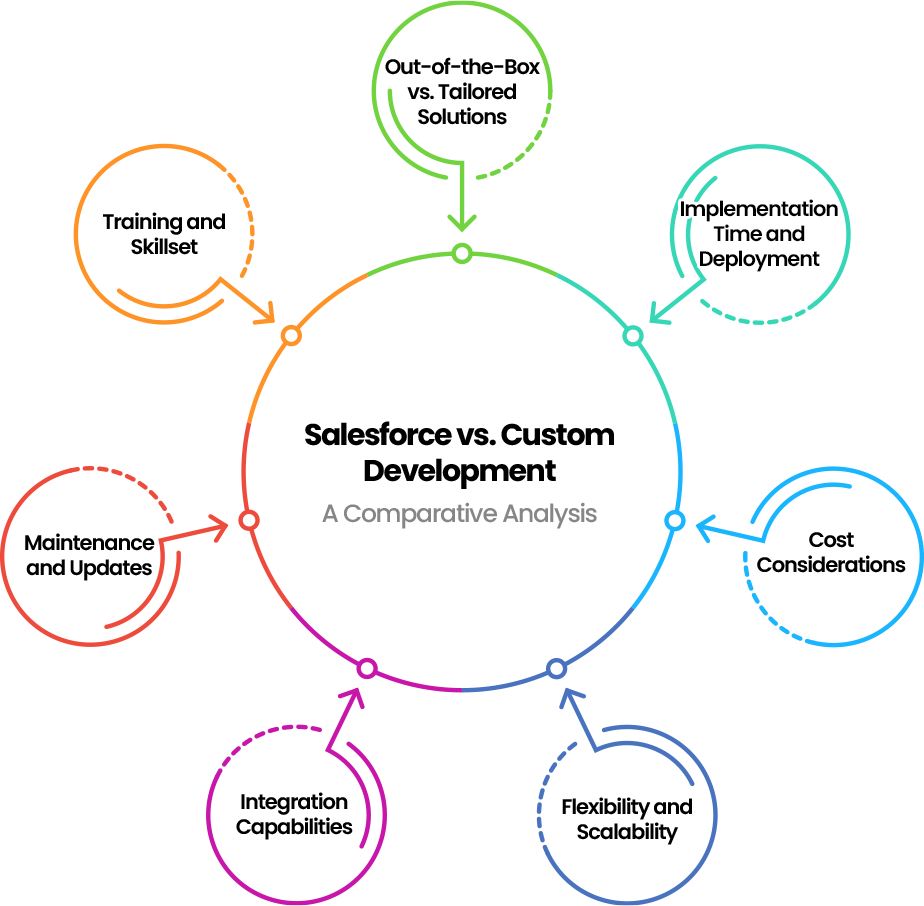In the fast-paced and ever-changing world of business, organisations are constantly seeking ways to streamline their operations and enhance productivity. To achieve these goals, tapping into the potential of robust software solutions is crucial. If you’ve been contemplating custom development for your business, there’s a standout platform you should be aware of: Salesforce.
This blog is here to show you why Salesforce outshines custom application development, providing insights for organisations to make informed software decisions, and promoting growth and success.
What is Custom Development?
Custom development is the process of creating software tailored to a specific business’s unique needs, often involving skilled developers and IT professionals. They work together to understand the business’s objectives, processes, and workflows, resulting in a highly customised solution that precisely caters to these needs.
A Real-World Example
Starbucks recognised the specific needs of its customers, who desired a convenient way to order and pay for their favourite beverages. In 2009, Starbucks launched the Starbucks Card Mobile application and MyStarbucks app, which allow customers to find nearby stores, nutrition details, and an interactive drink builder.
The company invested in custom application development to create a tailored solution that aligned with Starbucks’ processes and customer preferences.
The global custom app development market is expected to grow to USD 35.42 billion by 2032, with a CAGR of 22.5%, according to Grand View Research. This growth highlights the growing demand for personalised software solutions across various industries.
Businesses can generate revenue, reduce costs, and boost efficiency through custom app development, depending on their specific needs, industry, and the complexity of processes that could benefit from automation or streamlining through custom applications.
Benefits of Custom Development
Building custom apps, although demanding more upfront investment compared to off-the-shelf solutions, presents several unique advantages that can prove highly beneficial for businesses in the long run.
1. Tailored to Your Specific Needs
Unlike generic software, custom applications are tailored to your specific business needs and workflows. It ensures seamless integration with your processes, data, and user interface preferences and eliminates the need for workarounds and adaptations.
2. Increased Efficiency and Productivity
Custom apps automate manual tasks, streamline workflows, and improve data accessibility, leading to increased efficiency, reduced errors, and a significant boost in team productivity.
3. Scalability and Flexibility
Custom applications are designed to grow with your business, allowing for easy expansion or contraction to meet changing requirements and user base, ensuring your software investment remains relevant and valuable and adapting seamlessly to your evolving business needs.
4. Improved Data Security and Control
Custom applications offer a higher level of security compared to off-the-shelf solutions. Developers can incorporate robust security measures tailored to your business needs.
It gives a protective shield around sensitive data, mitigating potential vulnerabilities, and strengthening your overall security posture.
Common Challenges Faced in Custom Application Development
Custom app development, while offering tailored solutions, comes with its own set of challenges. Two common challenges include:
1. Time Implications
- Complexity of Development: Custom applications often involve intricate features and functionalities, leading to a longer development cycle.
- Requirements Discovery: Identifying and defining precise requirements can be time-consuming, as it requires thorough communication and understanding between developers and stakeholders.
- Testing and Debugging: Rigorous testing and debugging processes contribute to extended development timelines, ensuring the application meets quality standards.
2. Cost Implications
- Initial Investment: Custom apps typically require a higher initial investment compared to off-the-shelf solutions, impacting upfront costs.
- Scope Changes: Changes in project scope during development can lead to additional costs, as adjustments may require additional resources and time.
- Skilled Workforce: The need for a skilled and specialised workforce can contribute to higher labour costs, especially when dealing with complex development tasks.
What is Salesforce?
Salesforce is a renowned cloud-based CRM platform that offers a user-friendly interface and versatile tools for managing and analysing customer interactions and data.
It offers a suite of features, including sales automation, marketing automation, customer service, and analytics through the cloud.
What Makes Salesforce a Popular Choice?
Salesforce is a popular choice due to its scalability, customisation options, and integration capabilities, catering to businesses of all sizes. It offers a unified solution that enhances customer engagement and streamlines processes, driving business success.
Read more: Why is Salesforce so Popular?
Benefits of Salesforce
1. Comprehensive CRM Functionality
Salesforce delivers a unified platform equipped with an array of Customer Relationship Management (CRM) tools. From sales to marketing and customer service functionalities, this platform is designed to streamline your business processes, ultimately enhancing the overall efficiency of your operations.
2. Cloud-Based Accessibility
Salesforce functions as a cloud-based platform, providing you with the flexibility to access your data and applications from any location with an internet connection. This feature not only allows you the freedom to work without constraints but also promotes collaboration among team members.
3. Scalability
Salesforce is a versatile platform that can be customised to suit the unique needs of businesses at different growth stages, ensuring that it can adapt to the unique challenges faced by both startups and large enterprises.
4. Customisation Capabilities
You can customise Salesforce to align with your specific processes and workflows. This flexibility inherent in Salesforce’s capabilities ensures that the platform adapts to your unique needs, fostering a more personalised and efficient user experience for your organisation.
Enrol in our Salesforce OmniStudio course and learn how tools like OmniStudio enable businesses to tailor their Salesforce experience.
5. Integration with Third-Party Applications
Salesforce offers seamless integration with various third-party applications, this allows you to link your CRM with other tools and systems, enhancing your overall productivity by creating a cohesive and interconnected ecosystem for your business.
6. Advanced Analytics and Reporting
Salesforce offers robust analytics and reporting tools, providing valuable insights into customer interactions, sales performance, and marketing effectiveness.
This data-driven approach empowers you for informed decision-making and strategy refinement, enhancing your overall business intelligence.
7. Enhanced Customer Experience
Salesforce offers a 360-degree view of customer interactions, enhancing personalised and responsive experiences. Salesforce’s tools empower your organisations to build stronger relationships, anticipate customer needs, and provide timely support, thereby improving customer satisfaction and loyalty.
8. Artificial intelligence (AI)
You can leverage Salesforce Einstein, a set of AI tools designed to enhance the performance of Salesforce. For instance, you can use Einstein to predict customer churn, personalise marketing campaigns, and identify potential sales opportunities, bringing the power of artificial intelligence to optimise your Salesforce experience.
Salesforce vs. Custom Development: A Comparative Analysis

1. Out-of-the-Box vs. Tailored Solutions
Salesforce offers an out-of-the-box CRM solution with pre-built features and functionalities that are ready to use.
While, custom development involves creating a solution from scratch, tailored precisely to the unique needs and requirements of the business.
2. Implementation Time and Deployment
Salesforce has a quicker implementation time as it comes with pre-built components and configurations. Deployment is faster compared to custom solutions.
On the other hand, developing custom apps involves a longer implementation period as the development team needs to create and test the software based on specific business requirements.
3. Cost Considerations
While Salesforce CRM may have subscription costs, the initial investment is often lower compared to developing custom apps. It can result in cost savings over time due to reduced development time.
Custom development, in contrast, generally involves higher upfront costs due to the extensive development process and customisation. However, it may offer better long-term cost efficiency.
4. Flexibility and Scalability
Salesforce provides a high level of flexibility with customisation options. It is scalable and can adapt to the changing needs of the business.
While custom app development offers unparalleled flexibility as solutions are built from the ground up. Scalability depends on the architecture and design decisions made during development.
5. Integration Capabilities
Salesforce CRM has extensive integration capabilities with a wide range of third-party applications, providing a cohesive ecosystem.
In contrast, custom development’s integration capabilities depend on the development team’s expertise and may require additional effort to connect with other systems.
6. Maintenance and Updates
Salesforce manages maintenance and updates, ensuring the platform is up-to-date with the latest features and security patches. Users benefit from continuous improvements without additional effort.
While custom application development requires a dedicated effort for ongoing maintenance and updates. The development team is responsible for addressing issues, implementing updates, and ensuring compatibility with other systems.
7. Training and Skillset
Salesforce prioritises platform familiarity in its training, guiding individuals to master pre-built features and configurations, and fostering a culture of continuous learning. Salesforce certifications validate proficiency in CRM management.
On the other hand, custom app development emphasises programming proficiency, architectural design, and testing. Developers stay updated on industry trends. Cross-training opportunities create a versatile skill set.
Examples of Businesses That have Successfully Implemented Salesforce
Now, I will share two real-world examples of businesses that have successfully implemented Salesforce –
Example 1: Spotify
Spotify, a global music streaming service, faced challenges in managing its growing user base and personalised recommendations efficiently. Then, Spotify implemented Salesforce to streamline its customer relationship management.
The platform allowed Spotify to centralise customer data, track user preferences, and enhance personalised recommendations.
With Salesforce apps, Spotify significantly improved its ability to understand user behaviour, optimise recommendations, and deliver a more personalised music streaming experience. The implementation contributed to increased user engagement and satisfaction.
Example 2: Schneider Electric
Schneider Electric, a prominent player in energy management and automation on a global scale, faced the need for a unified platform to streamline sales processes, foster better collaboration among teams, and gain valuable insights into customer interactions.
In response, Schneider Electric chose Salesforce as its CRM solution. This move allowed them to consolidate sales data, automate workflows, and improve communication among their global teams.
Leveraging Salesforce, Schneider Electric successfully achieved a comprehensive 360-degree view of customer interactions, fostering enhanced collaboration and optimising its sales processes.
The platform’s robust analytics and reporting tools played a key role in providing valuable insights, facilitating more informed decision-making, and ultimately contributing to improved sales performance.
Conclusion
In conclusion, while custom development offers tailored solutions, it comes with challenges such as time implications and cost considerations. Salesforce apps, with their comprehensive CRM functionality, cloud-based accessibility, scalability, and customisation capabilities, emerge as a compelling alternative.
Ultimately, the choice between Salesforce and developing Custom Applications depends on the specific needs, budget, and preferences of the business.
As you navigate the path of software decisions, remember: in the race for business excellence, Salesforce doesn’t just keep pace; it leads the way.











